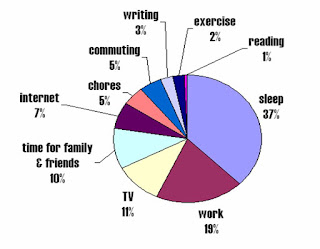Truth
The polarisation of political and social opinion grows increasingly radical. This "us" and "them" mentality is like a centrifuge, spinning ever more rapidly, and attracting like elements to opposite ends of the spectrum. Politics, from Australia, to Asia, to Europe and the US, bear only the most obvious consequence of polarisation, because of media publicity. But polarisation has its roots in the ground. The local worker demonises the immigrants whom he believes are are taking his job. The immigrant believes the locals are close-minded and xenophobic. The rich and successful 1% say the 99% don't succeed because they are lazy and stupid. The 99% protest against the 1% for being corrupt and selfish. Which is true?
Perhaps this is inevitable snapback from a time in which truth has been said to be relative for too long. The fact is, there is truth. Even within the so-called liberal space, where the calling card has been that of "diversity" and "everything is relative", it's perhaps now grudgingly conceded that everything is a good idea, except a conservative one - see this New York Times article on "Confession of a Liberal Intolerance". Read it, really - it's a great article.
So the truth is important. But if truth is important, then how does one go about finding that truth? The media is one source. How many of us read, whether on mainstream or social media, that at the National Prayer Breakfast (an annual multi-faith event hosted by the US President), Donald Trump decided that it was a good idea to ask the attendees to "pray for TV ratings"? Many of us would have seen that, I suspect, because that was all the media headlines said, from Bloomberg to Reuters to Time to Forbes. We probably concluded "he's insane", and then promptly re-posted or tweeted an internet meme making fun of it, thereby further amplifying the message.
But how many of us went to read Donald Trump's actual speech? Out of curiosity, following the media hullabaloo, I did. It's available you know, just google it. What context did he say this in? It was obviously an "ice-breaker" joke, at the start of his speech. A bad joke, and yes in poor taste at a prayer meeting, but clearly... a joke.
Now, let me be clear, because some people get instantly upset when other people even hint that maybe the US President isn't evil incarnate. I don't endorse sexist, racist, bigoted attitudes or talk. Words have power, and you can't go around just saying anything you like. But the mere fact that I even have to make this caveat, so that people don't throw stones through my virtual windows, speaks for itself - there is a polarised, instinctive, "you're wrong, I'm right", "you're a bigoted, mouth-breathing troglodyte, I'm an erudite modern progressive" reaction.
My daughter was recently told by her teachers - read the newspapers. Which one, she asked. The New York Times, came the reply. Now, the New York Times is an excellent paper, so excellent that the only two external links in this post are to the New York Times. But even its own public editor recognises that they may have a problem in reporting bias - see this article here. So I told my daughter, read, but read critically. I am reminded of this joke from the old British comedy "Yes Prime Minister".
PM Hacker: Don't tell me about the press. I know exactly who reads the papers: The Daily Mirror is read by people who think they run the country, the Guardian is read by people who think they ought to run the country, the Times is read by people who actually do run the country, the Daily Mail is read by the wives of the people who run the country, the Financial Times is read by people who own the country, the Morning Star is read by people who think the country ought to be run by another country and the Daily Telegraph is read by people who think it is!
Sir Humphrey: Prime Minister, what about the people who read the Sun?
Bernard Wooley: Sun readers don't care who runs the country, as long as...
*Ahem. Never mind.*
The point is that the media puts a spin on what it says. And in today's media-saturated world, what the media says, increasingly shapes, rather than reports reality, or what truth is.
The truth is important. The truth needs to be properly reported (as far as that is possible in the hands of humans with opinions, rather than robots!). But let's play our part as consumers of media, and purveyors of social media, to be consciously discerning about what we read and responsible what we share.
However this war on the public opinion turns out, the truth does matter. And what is truth? A question that Pontius Pilate once spat at Jesus Christ, when Jesus stood before Pilate on trial (John 18:38). I am grateful for some truths that I have learned. Life matters - every person, young or old, rich or poor, base or genteel, yet unborn or dying. Love matters - love that is unconditional, love that runs too deep to say anything goes, love that results in service and sacrifice. And the Lord matters - God who reigns, God who loves, God who lives!
Perhaps this is inevitable snapback from a time in which truth has been said to be relative for too long. The fact is, there is truth. Even within the so-called liberal space, where the calling card has been that of "diversity" and "everything is relative", it's perhaps now grudgingly conceded that everything is a good idea, except a conservative one - see this New York Times article on "Confession of a Liberal Intolerance". Read it, really - it's a great article.
So the truth is important. But if truth is important, then how does one go about finding that truth? The media is one source. How many of us read, whether on mainstream or social media, that at the National Prayer Breakfast (an annual multi-faith event hosted by the US President), Donald Trump decided that it was a good idea to ask the attendees to "pray for TV ratings"? Many of us would have seen that, I suspect, because that was all the media headlines said, from Bloomberg to Reuters to Time to Forbes. We probably concluded "he's insane", and then promptly re-posted or tweeted an internet meme making fun of it, thereby further amplifying the message.
But how many of us went to read Donald Trump's actual speech? Out of curiosity, following the media hullabaloo, I did. It's available you know, just google it. What context did he say this in? It was obviously an "ice-breaker" joke, at the start of his speech. A bad joke, and yes in poor taste at a prayer meeting, but clearly... a joke.
Now, let me be clear, because some people get instantly upset when other people even hint that maybe the US President isn't evil incarnate. I don't endorse sexist, racist, bigoted attitudes or talk. Words have power, and you can't go around just saying anything you like. But the mere fact that I even have to make this caveat, so that people don't throw stones through my virtual windows, speaks for itself - there is a polarised, instinctive, "you're wrong, I'm right", "you're a bigoted, mouth-breathing troglodyte, I'm an erudite modern progressive" reaction.
My daughter was recently told by her teachers - read the newspapers. Which one, she asked. The New York Times, came the reply. Now, the New York Times is an excellent paper, so excellent that the only two external links in this post are to the New York Times. But even its own public editor recognises that they may have a problem in reporting bias - see this article here. So I told my daughter, read, but read critically. I am reminded of this joke from the old British comedy "Yes Prime Minister".
PM Hacker: Don't tell me about the press. I know exactly who reads the papers: The Daily Mirror is read by people who think they run the country, the Guardian is read by people who think they ought to run the country, the Times is read by people who actually do run the country, the Daily Mail is read by the wives of the people who run the country, the Financial Times is read by people who own the country, the Morning Star is read by people who think the country ought to be run by another country and the Daily Telegraph is read by people who think it is!
Sir Humphrey: Prime Minister, what about the people who read the Sun?
Bernard Wooley: Sun readers don't care who runs the country, as long as...
*Ahem. Never mind.*
The point is that the media puts a spin on what it says. And in today's media-saturated world, what the media says, increasingly shapes, rather than reports reality, or what truth is.
The truth is important. The truth needs to be properly reported (as far as that is possible in the hands of humans with opinions, rather than robots!). But let's play our part as consumers of media, and purveyors of social media, to be consciously discerning about what we read and responsible what we share.
However this war on the public opinion turns out, the truth does matter. And what is truth? A question that Pontius Pilate once spat at Jesus Christ, when Jesus stood before Pilate on trial (John 18:38). I am grateful for some truths that I have learned. Life matters - every person, young or old, rich or poor, base or genteel, yet unborn or dying. Love matters - love that is unconditional, love that runs too deep to say anything goes, love that results in service and sacrifice. And the Lord matters - God who reigns, God who loves, God who lives!










Comments